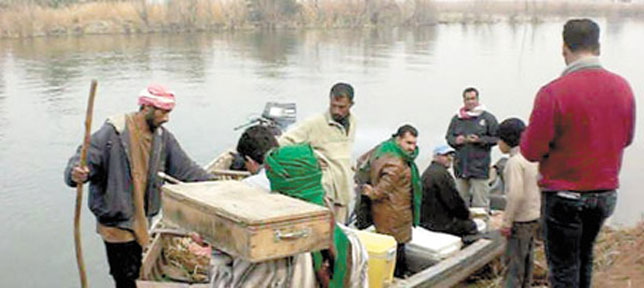 |
| Iraqi students and faculty from the University of Basra prepare for a field survey of the marshes in the spring of 2008. |
As a Canadian project to help restore the fabled Iraqi marshes winds down, the project’s director is optimistic about the future of this culturally and ecologically important region. Barry Warner, a specialist in wetland science and chair of the University of Waterloo’s department of earth and environmental science, says the vast marshland region at the confluence of the Tigris and Euphrates Rivers is not fully restored, but it’s certainly bigger than it was during the reign of Saddam Hussein.
The largest wetland ecosystem in the Middle East, originally covering an area roughly the size of Lake Ontario, the Iraqi marshes were reduced to less than 10 percent of their size during the 1990s due to the construction of dams and hundreds of drainage channels by the Iraqi government. This not only destroyed an important wetland habitat but also displaced most of the people who lived there, erasing their traditional lifestyle and culture.
When the Saddam government fell in 2003 following the U.S. invasion, many scientists called for the restoration of the marshes as a priority. The Canadian International Development Agency had money earmarked to assist with Iraqi redevelopment, and when Dr. Warner proposed a project to help restore the marshes, CIDA accepted, kicking in $8 million over five years. The project began in 2004 and is set to wrap up later this year.
The main goal of the project has been to train Iraqis how to restore and manage the wetlands, Dr. Warner explains. “During the Saddam Hussein regime, the [Iraqi] scientific community was isolated from the rest of the world… So our job is to try to reacquaint them with wetland science and bring them back up to speed,” he says.
The University of Waterloo’s Wetlands Research Centre has contributed most of the scientific expertise, with the University of Victoria also collaborating in the later stages. Their main partner has been the Iraq ministry of water resources along with professors and students at a handful of universities in southern Iraq.
A key activity has been to conduct field surveys of the marsh region. It’s the first scientific data coming from the area in more than 20 years. “We’ve made a very significant contribution. We’ve given them a baseline of information on which they can build for the next five, 10, 20 years to monitor how the restoration process is going.” says Dr. Warner.
According to United Nations estimates, about 60 percent of the marshlands have been re-flooded. “But just because you’ve got water there, that doesn’t mean it’s going to lead to a fully viable long-term sustainable wetland ecosystem,” says Dr. Warner.
The biggest challenge facing the marshes are the numerous dams and reservoirs being constructed at the headwaters of the Tigris and Euphrates rivers outside Iraq in neighbouring Turkey, Iran and Syria. The volume of water making it to the southern end of the watershed will be dependant on how those dams are managed. “There are going to be major challenges, especially on the Iranian side.”
Because of the continuing instability in Iraq, the Canadian participants have never actually set foot in the country. Instead, they have collaborated by holding workshops in countries around the region, primarily Syria and Jordon, and also by sponsoring Iraqis to come to Waterloo. Dr. Warner hopes to visit the marshes one day, “but I don’t see it in the immediate future.”